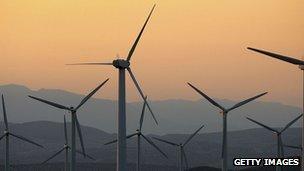Tourism Alliance says Scottish wind farm claims are 'hysterical'
- Published

The impact of wind farms has sparked huge debate
Claims that tourism will be damaged by wind farms are based on "emotion, hysteria and conjecture", an industry group has said.
Stephen Leckie, of the Scottish Tourism Alliance, told MSPs there was "little evidence" of the developments putting off visitors.
Mr Leckie said that wind farm impact research was last carried out in 2007 but was now "way out of date".
But the Ramblers Scotland group claimed turbines threaten Scotland's beauty.
Giving evidence to Holyrood's economy committee, which is looking into the Scottish government's renewable energy targets, Mr Leckie said: "Much of the argument so far has been from the emotional side. Everyone has a view but on research-based data evidence, there is very little in tourism terms."
He said there were about 130 wind farms, with another 24 under construction, 104 which have planning permission and 177 in planning stage, but argued there were many unanswered questions about their impact.
Mr Leckie said: "So what we hear is the extreme views, the hysterical people who say, 'not in my backyard, we don't want wind farms', but that is just emotional."
However, pressure group Ramblers Scotland said onshore wind farms were threatening Scotland's reputation as a country with world-famous natural beauty, and would hit tourism.
Dave Morris, director of the organisation, said in response to Mr Leckie's comments: "I do agree that there is an issue with evidence and the position is inconclusive."
US tycoon Donald Trump, who is due to appear before the committee next week, is opposing plans to build an offshore wind farm near his £1bn golf resort in Aberdeenshire, claiming such developments would kill off tourism.
Mr Trump has also claimed Scotland is committing financial suicide by creating a "wind farm landscape".
The Scottish government said tourism has continued to grow, while Scotland's green energy potential was creating thousands of much-needed jobs.
- Published14 April 2012
- Published12 March 2012
- Published7 March 2012
- Published28 February 2012
- Published18 January 2012
- Published26 February 2012